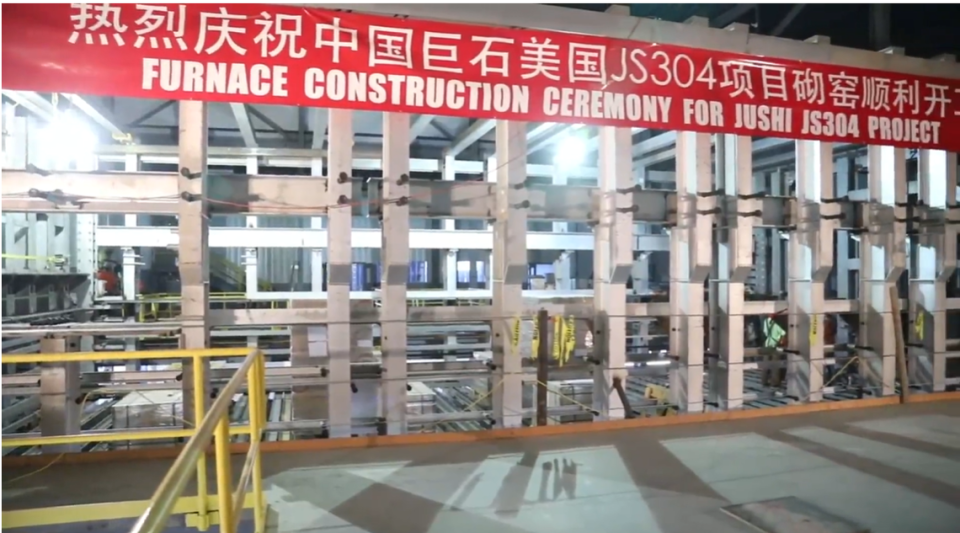Chinese factory broke environmental rules for years after it opened in SC, records show
Smiles and handshakes brightened the chill of a winter day in 2016 as South Carolina leaders congratulated themselves on a job well done.
Industrial recruiters had negotiated for years to bring a Chinese manufacturing plant to Columbia, a state capital that needed private industry to diversify its economy, which was heavily dependent on government jobs.
So it was hard to suppress the delight politicians felt when they broke ground on a fiberglass factory that represented Richland County’s largest industrial announcement in more than 30 years.
What they didn’t foresee were the troubles that lay ahead for China Jushi’s $300 million plant on Shop Road.
A looming set of environmental and safety problems would ensnare the fiberglass maker in years of disputes with state and local agencies.
After opening in May 2019, the factory let hazardous waste build up to potentially unsafe levels, discharged heavy metals into Columbia’s sewer system and repeatedly broke air pollution laws, according to public records obtained by The State.
Collectively, government documents show hundreds of environmental violations.
In some instances, air pollution coming from the China Jushi USA plant was so thick it was difficult to see the sky. In others, toxins that rose into the air threatened public health, records show.
Air pollution was such a concern that state regulators briefly shut down the plant — a rare action — until immediate problems were addressed.
“Potentially harmful’’ wastewater the factory flushed into Columbia’s sewer system exceeded state limits, threatening to corrode and disrupt the system, according to a 2020 city of Columbia notice of violation. On at least one occasion, the company failed to take steps to prevent the “accidental ignition’’ of toxic waste, a 2022 DHEC enforcement report says.
Violations that began soon after the plant opened prompted South Carolina’s environmental agency to hit China Jushi USA with more than $460,000 in fines last year, an unusually high amount.
Meanwhile, the state labor department launched five separate investigations, finding the company violated worker safety laws on at least three occasions and hitting Jushi with more than $11,000 in fines, records show..
In one case a worker was pinned to a conveyor line and hospitalized. In that and another case, the company did not provide proper equipment to protect workers, according to state labor department records.
As China Jushi dealt with its environmental and safety issues, the company also found itself in court.
One former health and safety manager at Jushi, Al Leftwich, said in court documents he urged the company to fix problems at the plant but was rebuffed. The problems were then used against Leftwich as justification for firing him after he had missed several months with health issues, a 2021 lawsuit he filed against China Jushi USA says.
Leftwich, the plant’s environmental health and safety manager from 2017 to 2020, alleged in the suit that Jushi discriminated against him because he was an American at a Chinese-run plant, the suit said.
The company denied claims in the lawsuit but eventually settled the case for an undisclosed sum.
Repeated efforts by The State Media Co. to reach someone who could respond for China Jushi have been unsuccessful. But one company official in Columbia told state officials that Jushi has had some trouble following environmental rules.
In a May 1, 2023, letter to DHEC, company environmental, health and safety manager Maurice Caldwell said “there are no arguments from China Jushi into the violations found. We as a company have been making diligent efforts to correct the issues.’’
Some current and former government regulators said the China Jushi problems were more extensive and lasted longer than expected for a new company.
The company’s Richland County production plant was its first in the United States. The facility makes fiberglass for use in an array of industrial applications.
Whether Jushi’s compliance problems were related to a foreign company opening its first plant in the United States is unknown, but the issues followed turnover in management. Caldwell said he was the fifth environmental health and safety manager at China Jushi since it opened in Columbia.
As soon as he took the job, Caldwell sought an environmental audit to help get a grip on the breadth of the problems at China Jushi’s plant, according to the May 2023 letter that asked DHEC for leniency from a potential environmental penalty.
One former high-ranking state air pollution regulator, who asked not to be named because the person is retired, said it has not historically been typical for new plants to experience the number of challenges following the rules that China Jushi had after opening.
DHEC fines in excess of $400,000 for air pollution are not common, nor are orders for plants to shut down, as occurred with China Jushi in Columbia, the former regulator said.
“Typically, when a facility starts up and gets an air permit, they have the proper equipment and would have made sure that it operated properly,’’ the former regulator said.
The agency’s enforcement database indicates that the $410,000 fine for air violations is one of the highest single penalties DHEC has levied in at least 10 years, exceeding six-figure fines for a polluted industrial site in Greenville County, a packaging plant in Darlington County and a gold mine in Lancaster County.
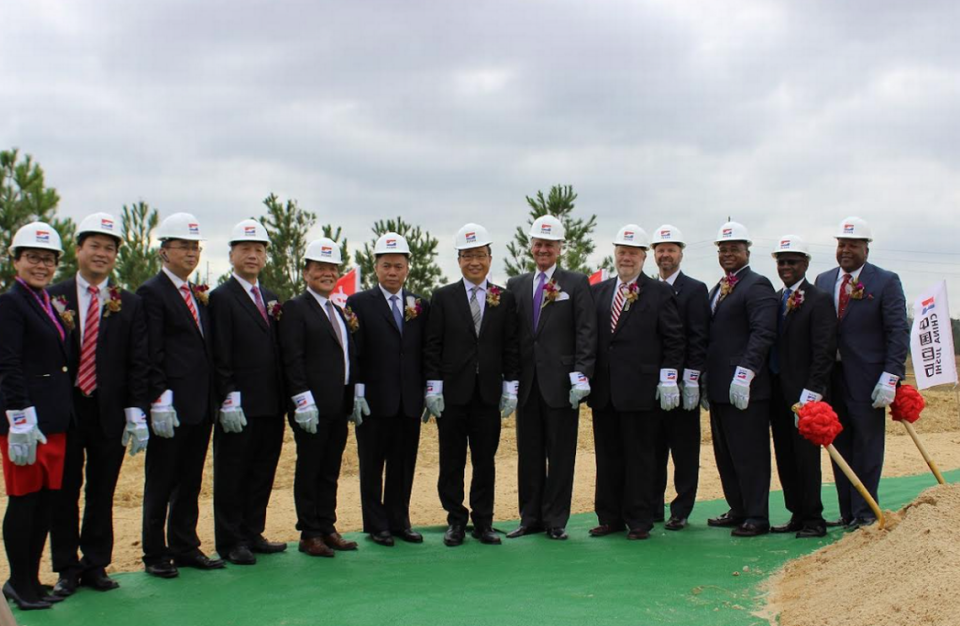
Who knew?
China Jushi’s troubles have sparked a variety of reactions from government leaders, including some who championed bringing the company to Richland County in 2016.
Gov. Henry McMaster, who was lieutenant governor under Gov. Nikki Haley when the state recruited China Jushi, is aware of the environmental issues surrounding the fiberglass factory and is concerned, a spokesman said.
But the issues are being handled through “the proper channels’’ by DHEC and the state labor department, said Brandon Charochak, a governor’s office spokesman.
“He’s confident there will be a fair and just outcome reached,’’ Charochak said.
In November, McMaster said China Jushi had not caused any trouble since locating in South Carolina, but Charochak said the governor was referring to security issues.
A spokesperson for Haley, a Republican candidate for president, did not provide a comment on China Jushi’s troubles.
Some local officials said they were unaware of the challenges China Jushi has had complying with environmental and worker safety regulations.
Among those is Torrey Rush, chairman of the Richland County Council during the China Jushi groundbreaking. In a brief interview with The State, Rush said jobs promised by the company were appealing, but he is no longer involved in politics and had little more to say.
“I just don’t know,’’ said Rush, who did not seek reelection to county council in 2016. ”I’ve not been engaged in it enough. I would be shooting in the dark trying to figure that out.’’
Paul Livingston, a veteran county councilman who supported recruiting China Jushi, said he also was unaware of the problems at the plant. But Livingston said he is glad state regulators held the factory accountable for issues that arose after it opened.
Livingston told The State there was “no reason to expect’’ the troubles China Jushi ran into.
Taxpayer advocate Don Weaver, a county councilman who was not in office when the plant opened, said the environmental violations were troubling.
“We want to recruit industries that have a good environmental track record,’’ Weaver said. “I don’t know what their experience may be in China, that maybe they don’t have these tough environmental laws. But we do.’’
“These companies should understand when they come here that we passed these environmental laws for a reason.’’
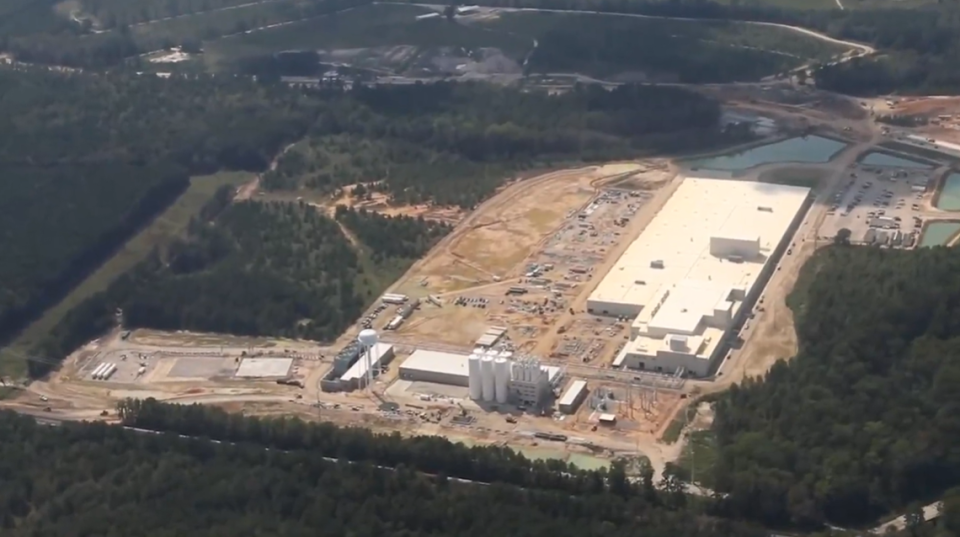
Prized industry
Before China Jushi had trouble with state environmental and health agencies, the company was seen as the cornerstone of an effort to bring world class industries to the Columbia area.
The international corporation, headquartered in Zhejiang, China, already was a global leader in fiberglass production. In addition to China, the company’s holdings include a large factory in Egypt that news reports show has made Jushi an economic leader in the Middle East and North Africa.
When the China Jushi USA plant opened in Columbia, it joined the worldwide effort, making fiberglass strands that eventually would wind up in things like windmill blades, boats and huge transfer trucks, The State reported in 2018.
Then Lt. Gov. McMaster was effusive in his praise of the company during the 2016 groundbreaking, which was attended by 200 people.
““We are poised to lead the rest of the nation in good, strong economic development … thanks to partnerships like this one between Richland County and China Jushi,’’ he said at the time.
Haley was equally enthusiastic.
“Get excited! China Jushi is creating 400 new jobs and investing $300 million right here in Columbia,’’ Haley wrote in a June 1, 2016, Facebook post. “They are the leading supplier of fiberglass reinforcements and fabrics worldwide.’’
To get China Jushi to locate in South Carolina, the state and local governments offered plenty of inducements. That included 197 acres of free land from the county for the plant site — valued at nearly $5 million — and a new, taxpayer-funded road to the property in a 900-acre industrial park. A 2019 county news release said the project to extend Shop Road cost $35 million.
The state Department of Commerce provided $7.2 million to prepare the site, including road and water and sewer upgrades. China Jushi was approved for job development credits, according to the commerce department. Neither the Department of Commerce nor Richland County would provide the total value of the incentive package.
Discussions with a top Commerce Department official had been underway since 2012, before the company announced in 2016 it would come here, according to a news report in The State and The Greenville News.
In return for incentives, China Jushi said it would create 400 jobs, with pay beginning at $16 per hour, at its facility on Shop Road. The plan was to expand the plant in the future, adding up to 400 more jobs.
China Jushi’s $300 million investment marked the largest in Richland County since the Union Camp paper mill committed to a $600 million investment in 1984, county officials said in 2016.
“I thought at that time, it was the quality of the jobs,’’ Livingston said of his interest in China Jushi. “It was also connecting with and creating that link and relationship with China for other opportunities possibly. It certainly was going to help (the county) with overall revenue.’’
For all the optimism about the plant when it was announced, Haley’s enthusiasm for the investment has cooled in the face of national political battles.
China Jushi is partly owned by the China National Building Material company, an entity that is tied to the Chinese government, The New York Times reported last year.
Haley sustained withering attacks from fellow Republican presidential hopeful Ron DeSantis, the Florida governor, during the 2024 campaign over her decision to bring in Chinese companies like Jushi.
DeSantis, who has since dropped out of the presidential race, said China is no friend of the United States but Haley had been too welcoming to Chinese investments. While Haley defended her actions, she’s now critical of Chinese intentions.
“Every governor in the country has tried to recruit Chinese businesses over the last how many years because everybody thought ‘Oh if we’re nice to China they’ll want to be like us, ‘ ’’ Haley told Fox News, the conservative media outlet.
But Haley indicated that the effort did not work. “They want to destroy the West.’’
The state Department of Commerce says it vetted China Jushi before bringing the company to Richland County. That involved reviewing financial statements, meeting with company representatives and completing a cost-benefit analysis. But the department “has no regulatory authority in any substantive area, including environmental and workforce safety matters,’’ spokeswoman Kelly Coakley said in an email.
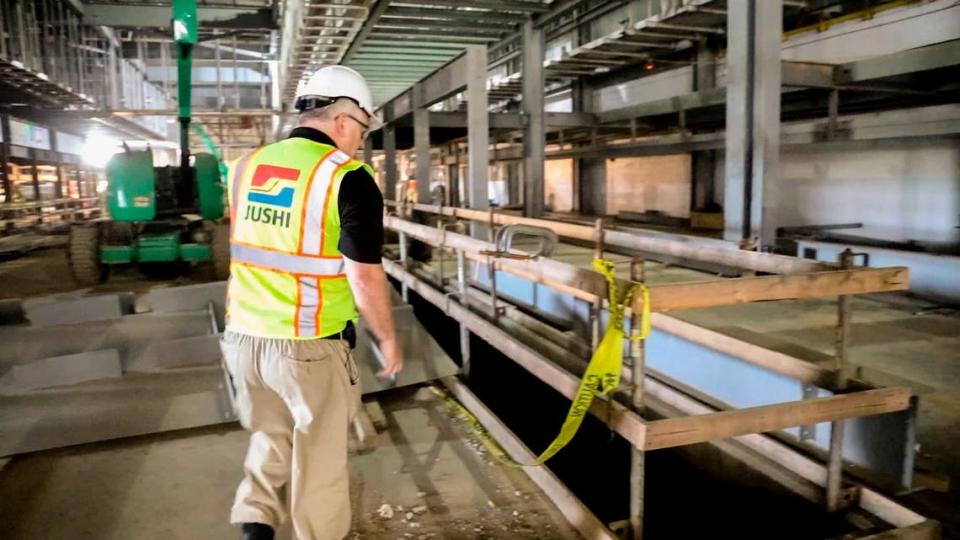
‘Significant non-compliance’
So what exactly happened after China Jushi arrived in Richland County?
At about the same time the plant was opening in 2019, environmental troubles surfaced.
A May 31, 2019 letter to China Jushi USA from the city of Columbia said the company was not submitting required reports on the wastewater it was flushing into the sewer system. Those reports are important to keep track of discharges that could corrode pipes or hurt the city’s wastewater treatment system if not within legal limits.
By July 2019 — two months after the plant opened — Columbia officials found the factory in “significant non-compliance’’ with wastewater regulations, according to a 2019 letter from the city to China Jushi.
In November of that year, Columbia hit China Jushi with a notice of violation for exceeding pH limits in wastewater, as well as releasing too much wastewater, records show. A November 2019, letter from the city to China Jushi said the company had repeatedly failed to correct problems from May to September of that year.
Toxic metals, such as arsenic, lead and mercury, were among contaminants the factory discharged above approved limits. That occurred between January 2022 and July 2022, three years after the plant opened, according to city records reviewed by The State.
Columbia inspectors also found fiberglass scattered around the plant basement, clogging drains and causing liquid to pool, a September 2022 city report said.
Clint Shealy, Columbia’s assistant city manager over utilities, said new companies sometimes have trouble complying with environmental regulations in the year after they open, but it is not common to have lingering problems for multiple years, as China Jushi has had.
“Theirs extended for longer than the one year or so that you typically see,’’ Shealy said.
Shealy said he is not aware that the company challenged any of the city’s findings.
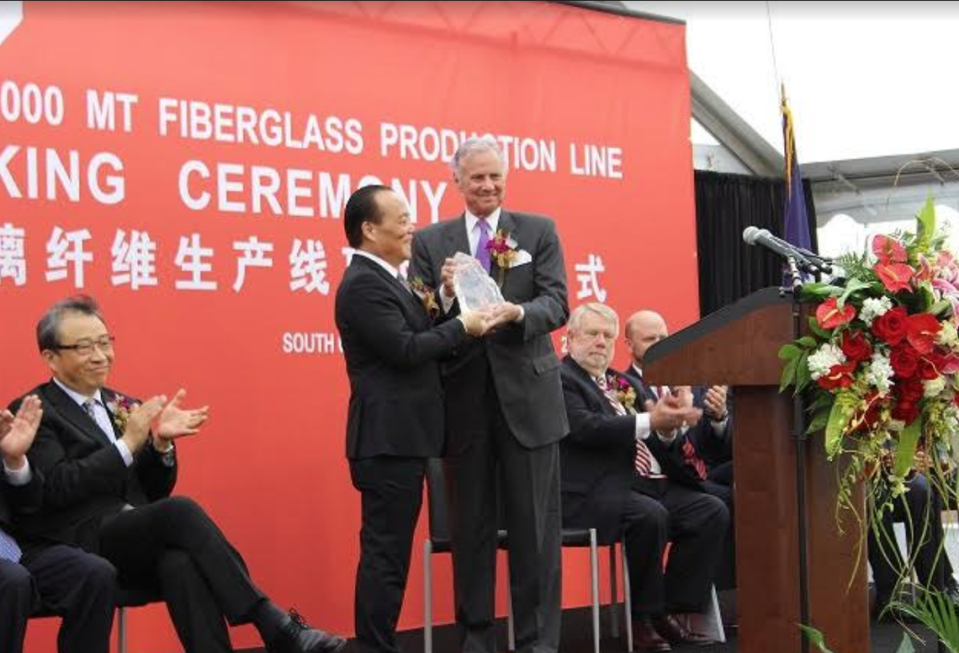
Hundreds of violations
As wastewater problems were emerging, state regulators also were finding problems with air pollution at China Jushi’s factory.
Two months after the Jushi plant opened, DHEC discovered that the company was exceeding air pollution limits for nitrogen oxide, a finding that would foreshadow a string of air problems involving China Jushi, enforcement records show.
Nitrogen oxide is a pollutant that, at low levels, can cause eye, nose and lung irritation, resulting in coughing and shortness of breath,according to the federal Agency for Toxic Substances and Disease Registry. High levels can cause spasms and tissue swelling in the upper respiratory tract, buildups of fluid, and — in extreme cases —death, the agency says.
China Jushi also released excessive amounts of particulate matter, or soot, for 219 days over three years beginning in July 2019, according to a May 2023 enforcement order signed by both DHEC and company officials.
Particulate matter can create smoggy, hazy conditions, and it can be a health hazard for people who breathe in the sooty material. It can worsen asthma, decrease lung functions and cause people to cough.
Perhaps the most stark problems cited by regulators at China Jushi USA were releases of a smoky material that was so thick it clouded the sky.
On multiple occasions, the factory violated what are known as opacity limits. These are measures of the thickness of air pollution and whether that blocks visibility.
At China Jushi’s plant, DHEC found that the company had violated opacity limits 120 times in 2022, according to inspection records from that year. The limit was 20%, but in some cases the opacity readings approached 100 percent, records show. DHEC’s May 2023 enforcement order, signed by a China Jushi official, cited the plant for violating opacity limits.
The problem, according to an Aug. 16, 2022, inspection report, was linked to clogs in a poorly equipped air pollution control system. The control system needed 800 filters, but was operating with only 300. The company was scrambling to airlift control filters in from Taiwan, the report said.
DHEC’s inspection came a day after the agency received a complaint of a “white powder’’ leaving a smoke stack at China Jushi, the report said. The department’s 2023 enforcement order said the company had failed to operate pollution control equipment for nitrogen oxide, particulate matter and sulfur dioxide.
These were among problems serious enough that DHEC took the rare step of shutting down the company through an emergency order on Sept. 1, 2022.
The department said it took the emergency action “to address the danger to public health, safety and welfare presented by China Jushi’s operations in the absence of emission controls maintained and operated in a manner consistent with good practice.’’
Agency officials lifted the emergency order the next day, after China Jushi took steps to control the problem.
DHEC’s May 2023 enforcement order fined China Jushi USA $410,000 for air pollution violations. The company paid the fine, the agency said in a Jan. 10 email to The State.
Flammable waste
But China Jushi’s troubles were not limited to air pollution and wastewater discharges.
China Jushi also paid a $57,000 penalty for violating hazardous waste laws, DHEC said.
Among the transgressions cited by DHEC were battery leaks, spilled liquids, China Jushi’s failure to tell the agency it was generating large amounts of hazardous waste, and a lack of hazardous waste training by employees, according to a Nov. 21, 2022, violation notice and a May 26, 2023, hazardous waste enforcement order signed by a China Jushi official.
DHEC also said 10 of 55 containers at the plant were storing “corrosive, flammable and toxic waste streams,’’ including sulfuric acid and hydrofluoric acid, the violation notice said. While some of material at the site was ignitable, China Jushi didn’t tell DHEC, the violation notice and enforcement order said.
The company’s issues with serious worker safety violations resulted from complaints to the Department of Labor, Licensing and Regulation about conditions inside the fiberglass factory. The company paid $11,625 in fines for three serious labor violations, according to labor department records and an agency spokeswoman.
The serious violations included one case in which 12 chopping devices were not protected properly, the labor department said in citing the company for exposing a worker to a knife and blade roller. Additionally, a cover on one chopping machine was disconnected and left open while the machine was running, a June 10, 2021, letter from the labor department to Jushi said.
In the early spring of 2022, another serious violation involved a worker who was pinned to a conveyor line. The accident caused the employee to collapse and be sent to the hospital, according to Occupational Safety and Health Records.
The Department of Labor Licensing and Registration did not comment specifically on the China Jushi cases, but said serious violations aren’t anything to discount. A violation is considered serious if there is a substantial chance that death or serious harm could result from a plant condition, the agency said in an email to The State.
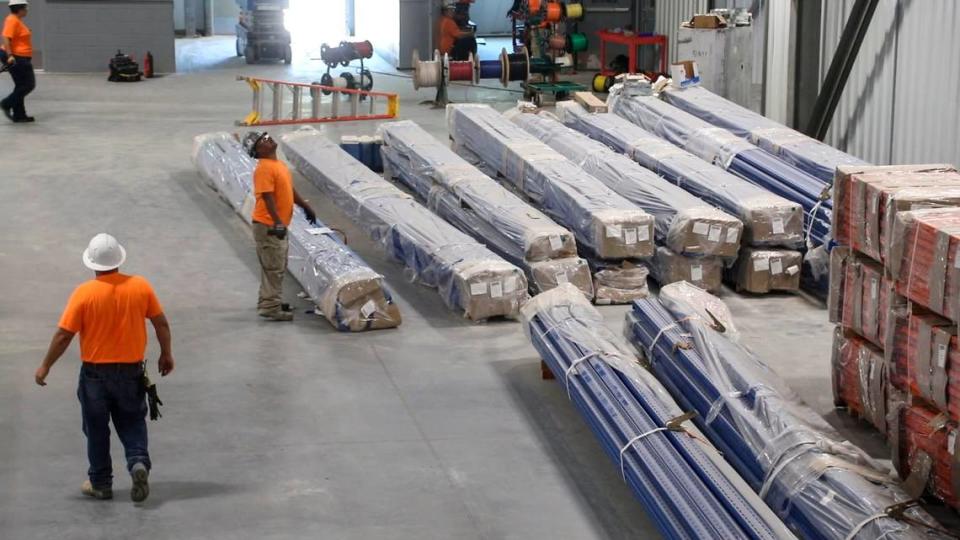
Next steps
Several former and current state and local officials say they believe China Jushi is trying to resolve problems, and is beginning to have success.
Shealy, the city of Columbia utilities chief, said recent violations of wastewater standards were not substantially higher than the limits.He said he doesn’t remember the company ever challenging the city’s findings, but instead, has tried to resolve the problems.
“They had some startup issues; there were some lingering problems beyond that,’’ Shealy said. “We are working with them to try to get those addressed.’’
A spokeswoman for the Department of Health and Environmental Control said in a recent email that the agency has no pending enforcement actions against China Jushi.
Lewis Gossett, a former head of both the state labor department and the SC Manufacturers Alliance, said South Carolina has generally had a good track record in recruiting industries that follow environmental and safety laws, noting that BMW has been a good corporate citizen since the German automaker opened a plant in Spartanburg County more than 30 years ago.
Gossett, who said the environmental and safety violations “seems like a lot to me,’’ said the key now is for China Jushi to make improvements to reduce any troubles.
“They’re obviously running into some challenges regarding various start-up’’ efforts, Gossett said. Jushi “should hire the right kind of regional consultants and people that can help them move through these things.’’
